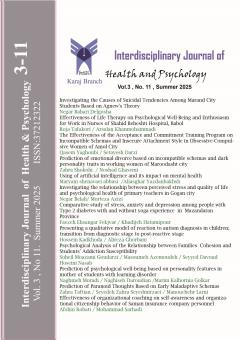مقایسه میزان استرس، اضطراب و افسردگی در بین افراد مبتلا به دیابت نوع2 دارای تجربه یوگا و بدون تجربه یوگا استان مازندران - فائزه احسانگر فکجور/ خدیجه حاتمی پور
الموضوعات : Health Sciences and Psychologyفائزه احسانگر فکجور 1 , خدیجه حاتمی پور 2
1 -
2 - استادیار- دانشگاه آزاد اسلامی واحد تنکابن
الکلمات المفتاحية: استرس , اضطراب , افسردگی , دیابت نوع2 , یوگا ,
ملخص المقالة :
چکیده
هدف: دیابت یکی از شایع ترین و گران ترین بیماری های غدد در جهان است. در بین انواع دیابت، دیابت نوع2، بیشترین شیوع را داشته و بر جنبه های جسمی و روانشناختی زندگی اثرگذار است. هدف از این پژوهش، مقایسه میزان استرس، اضطراب و افسردگی افراد مبتلا به دیابت نوع2 دارای تجربه یوگا و بدون تجربه یوگا استان مازندران در سال 1402بود.
روش ها: تحقیق حاضر از نوع توصیفی- مقایسه ای بود. شرکت کنندگان شامل 164 نفر از مبتلایان به دیابت نوع2 عضو انجمن دیابت و بیماری های غیر واگیردار استان مازندران بودند که در دو گروه 82 نفری شامل مبتلایان دارای تجربه و بدون تجربه یوگا به روش نمونه گیری در دسترس انتخاب شدند. ابزارهای پژوهش شامل پرسشنامه جمعیت شناختی و پرسشنامه افسردگی، اضطراب و استرس(DASS-21) بود که از طریق شبکه های مجازی مرتبط با انجمن به صورت آنلاین در دسترس افراد قرار گرفت. داده ها با استفاده از نسخهspess22 و از طریق آزمون تحلیل واریانس چند متغیری (مانوا) تجزیه و تحلیل شدند.
نتایج: نتایج نشان داد، بین دو گروه از لحاظ استرس، اضطراب و افسردگی تفاوت آماری معنی داری وجود دارد و افراد مبتلا به دیابت با تجربه یوگا در مقایسه با افراد دیابتی بدون تجربه یوگا نمرات کمتری در استرس، اضطراب و افسردگی کسب کردند.
نتیجه گیری: نتایج نشان داد که تمرینات یوگا می تواند باعث کاهش میزان استرس، اضطراب و افسردگی در افراد مبتلا به دیابت نوع2 شود و به عنوان یک روش درمانی مکمل مورد استفاده قرار گیرد.
1. Nazary Gilannejad T, Gaeini AA, Foroughi Pordanjani A, Omidi N. 2017, Comparing the Effect of 12 Weeks of Hatha Yoga and Aerobic Exercise on Serum Cortisol Values, Stress, Anxiety and Depression in Women with Diabetes Type 2. Razi Journal
of Medical Sciences,24(157):89-81. [full text In Persian] 2. kharatzadeh H, Davazdah Emamy MH, Bakhtiari M, Mahaki B. 2019, Effectiveness of Mindfulness-based Stress Reduction on the Quality of Life of Patients with Type II Diabetes Mellitus. Journal of Diabetes Nursing. 6(4):607-17. [ full text In Persian]
3. Kumar GV, Aghili SM, Zaree M. 2022, The Effectiveness of Mindfulness-Based Stress Reduction Training on Adherence to
Medication and Proper Food Consumption in Patients with Diabetes Type 2. Iranian Journal of Health Psychology; Vol. 5(2) . 4. Yuniartika W, Sudaryanto A, Muhlisin A, Hudiyawati D, Pribadi DRA. 2021, Effects of Yoga Therapy and Walking Therapy in Reducing Blood Sugar Levels on Diabetes Mellitus Patients in the Community. Open Access Macedonian Journal of Medical
Sciences. 9(E):906-12 5. Thangasami SR, Chandani AL. 2015, Emphasis of Yoga in the Management of Diabetes. Journal of Diabetes &
Metabolism. 6(10) 6. Heidari E, Shirazi M, Sanaguye Moharer GR. 2020, Effectiveness of laughter Yoga training on quality of life and mental
health of Diabetic women. Journal of Applied Family Therapy. 1(3):4-22. [ full text In Persian] 7. Poongothai S, Vidyulatha A, Nisha T, Lalasa M, Bhavani Sundari B, Karkuzhali K, et al. 2021, Impact of yoga intervention on
physical and mental health of adults with type 2 diabetes: Study design and methodology. Journal of diabetology. 12(4). 8. Wen Y, Han X, Sun M, Wang L, Zhu X, Wang X, Wang C. 2023,The anxiety and depression status and related influencing
factors in patients with type 2 diabetes: Why should we care. Journal of Radiation Research and AppliedSciences. 16(1). 9. Smith KJ, Deschenes SS, Schmitz N.2018, Investigating the longitudinal association between diabetes and anxiety: a
systematic review and meta-analysis. Diabet Med. 35(6):677-93 10.
Bhat NA, Muliyala KP, Kumar S.2020, Psychological aspects of diabetes. Diabetes. 11. Thind H, Guthrie KM, Horowitz S, Conrad M, Bock BC.2019, "I can do almost anything": The experience of adults with type
2 diabetes with a yoga intervention. Complement Ther Clin Pract. 34:116-22 12. Shiju R, Thomas D, Al Arouj M, Sharma P, Tuomilehto J, Bennakhi A.2019, Effect of Sudarshan Kriya Yoga on anxiety,
depression, and quality of life in people with type 2 diabetes: A pilot study in Kuwait. Diabetes Metabsyndr. 13(3):1995-9 13. Bock BC, Thind H, Fava JL, Dunsiger S, Guthrie KM, Stroud L, et al. 2019, Feasibility of yoga as a complementary therapy
for patients with type 2 diabetes: The Healthy Active and in Control (HA1C) study. Complement Ther Med. 42:125-31 14. Sarika KS, Kumar H, Balakrishnan V, Sundaram KR. 2020, Impact of Integrated Amrita Meditation((R)) technique on stress
in type 2 diabetic patients. Indian J Med Res.152(5):508-14 15. Park CL, Finkelstein-Fox L, Groessl EJ, Elwy AR, Lee SY. 2020, Exploring how different types of yoga change psychological
resources and emotional well-being across a single session. Complement Ther Med. 49:102354 16. Mohammad A, Thakur P, Kumar R, Kaur S, Saini RV, Saini AK. 2019, Biological markers for the effects of yoga as a
complementary and alternative medicine. J Complement Integr Med. 16(1) 17. Vajpeyee M, Tiwari S, Jain K, Modi P, Bhandari P, Monga G, et al.2022, Yoga and music intervention to reduce depression,
anxiety, and stress during COVID-19 outbreak on healthcare workers. Int J Soc Psychiatry. 68(4):798-807 18. Cramer H, Lauche R, Anheyer D, Pilkington K, de Manincor M, Dobos G ,Ward L. 2018,Yoga for anxiety: a systematic
review and meta-analysis of randomized controlled trials. Depression and Anxiety. 35 (9): 830-843. 19. Dai Y, Li J. 2022, The Progress of yoga for the treatment of anxiety. highlights in science, engineering and technology. 8:
582-590. 20. Prathikanti S, Rivera R, Cochran A, Tungol JG, Fayazmanesh N, Weinmann E. 2017, Treating major depression with
yoga: A prospective, randomized, controlled pilot trial. PLoS One.; 12(3): 1-36


